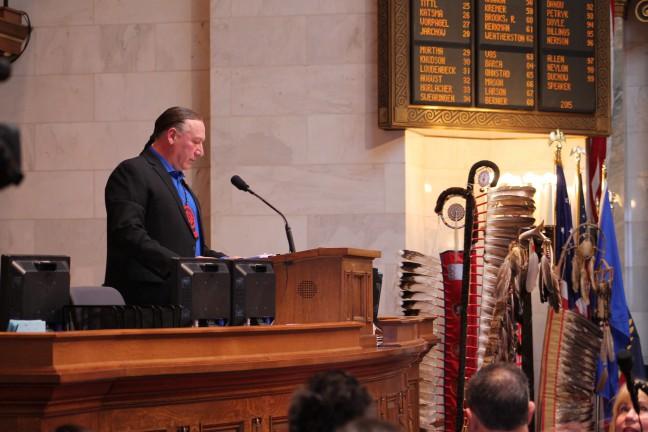A tribal chairman aimed to debunk myths and misconceptions about American Indians Tuesday in the State of the Tribes speech.
The State of the Tribes aims to promote better communications with tribal nations and the state of Wisconsin, Speaker Robin Vos, R-Rochester, said in a statement. This was the 12th annual address.
“I’m pleased that we can continue this Assembly tradition,” Vos said in the statement. “It’s important to find areas of mutual interest between our governments and work together to address shared concerns.”
Michael Isham, chairman of Lac Courte Oreilles Band of the Lake Superior Chippewa Indians of Wisconsin, who gave the speech, said many Wisconsin residents believe myths about American Indian tribes. He cited inaccurate beliefs — like the belief all tribe members are pagan, are rich from casinos, live in teepees, always vote Democrat and receive free tuition at universities — as a danger to outsiders.
Wisconsin residents know very little about tribes as they exist today, Isham said, and more needs to be done to dispel stereotypes.
“With stronger education about tribal history and culture we believe these types of issues will arise less often,” Isham said.
Act 31 is a law in Wisconsin that requires PK-16 education systems to teach students about Wisconsin American Indian history, culture and tribal reserve rights, according to the University of Wisconsin School of Education. Isham said he’s not convinced all schools are actually complying with Act 31 and the law does not go far enough to educate students. It’s a good start, but needs improvement, he added.
Isham pointed to the actions of Craig Olson, Hayworth community school district superintendent, as an example of measures educational institutions should be taking. Isham said Olson hired local tribal citizens as staff and invited tribal leaders to make presentations to students, as well as fulfilling Act 31.
Misconceptions can damage relationships between tribes and other Wisconsin residents, Isham said. Tribes are not pagan, Isham said, and practice religion similarly to other citizens in the state. They also are voting in higher numbers and have supported both Democratic and Republican candidates. American Indians are also not all rich from casino profits, Isham said. Many tribe members struggle economically just like any American citizen.
One woman, Isham said, even expressed fear of getting a flat tire inside of an American Indian reservation because she did not know what to expect. He said the most likely response would have been tribe members helping her change the tire.
American Indians contribute greatly to society, Isham said, fulfilling a variety of roles including doctors, dentists, lawyers, teachers, professors, biologists, entrepreneurs, firefighters, police officers and movie stars. A University of Wisconsin basketball player, Bronson Koenig, is also an American Indian, Isham said.
“Tribal people are succeeding in all aspects of society just like non-Indian people do,” Isham said.
One of the biggest issues facing both tribe members and other citizens is college debt, Isham said. Contrary to what many Wisconsinites believe American Indians do not receive free educations, Isham said. He said it took him 10 years to pay off his student loans, and his daughter currently has almost $200,000 in student debt.
Isham also commented on recent legislation. He lauded the Legislature for killing a bill that would have lifted protections on some effigy mounds, but criticized a bill that would lessen restrictions on waterfront homes, which he said would damage Wisconsin’s environment.
Legislation would rewrite old water laws to increase waterfront property rights
All Wisconsinites — both those in tribes and those outside — should work together to address the most important issues in the state, Isham said.
“We must remember what we have in common and how we can overcome differences that some so vigorously try to exploit in an effort to divide us,” Isham said. “It’s better to seize upon similarities and tackle issues together.”

















